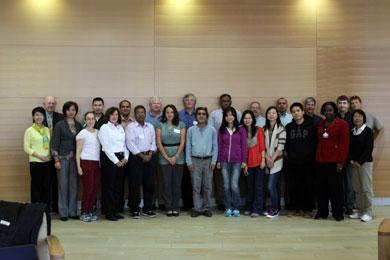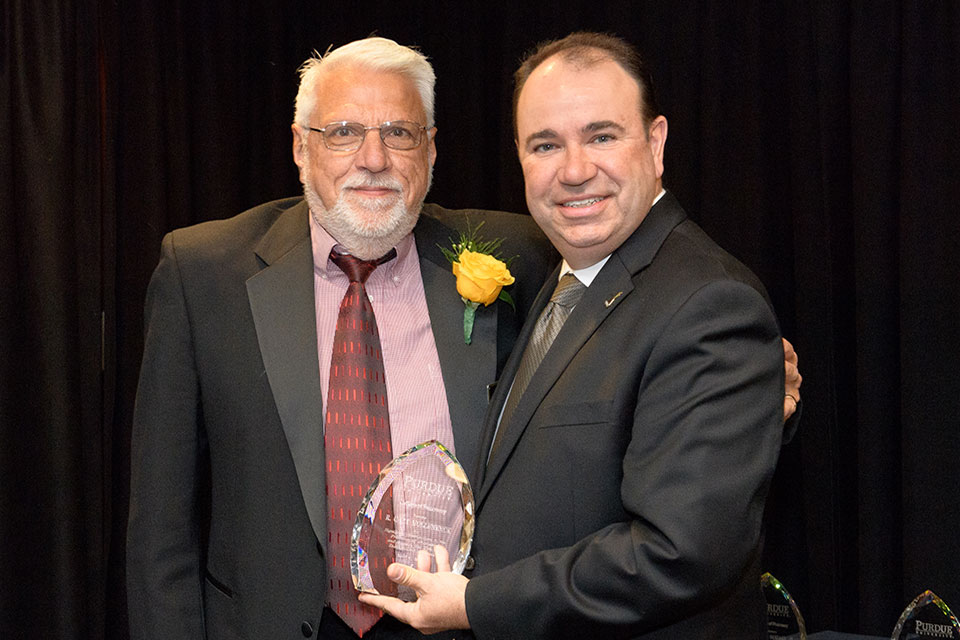SOP’s Hoag Hosts New Tablets & Capsules Hands-On Short Course
In-depth lectures and practical laboratory exercises introduce participants to tablet and capsule manufacturing.

By Malissa Carroll
October 30, 2013
On Oct. 25, Stephen Hoag, PhD, professor in the Department of Pharmaceutical Sciences (PSC) and director of the Good Manufacturing Practice (GMP) Facility at the University of Maryland School of Pharmacy, wrapped up the first-ever Tablets & Capsules Hands-On Short Course held at the School. The five-day course introduced participants to tablet and capsule manufacturing through in-depth lectures and extensive laboratory exercises.
“As a top research school, the University of Maryland School of Pharmacy is fortunate to be able to host events such as the Tablets & Capsules Hands-On Short Course that bring experts from academia and industry to our School,” says Andrew Coop, PhD, professor and chair of PSC. “These events are crucial to helping us provide students and members of the local research community with cutting-edge knowledge and skills that they can use to help advance their careers.”
The course was aimed at regulators from the Food and Drug Administration (FDA) as well as industrial researchers who work in formulation development, process development, quality control, and administration. It addressed all aspects of tablet and capsule manufacturing. Participants learned about raw material assessment and formulation development, the operations of a manufacturing unit, and end-product testing and quality control using process analytical technology (PAT) methods.
“Going through the manufacturing process from start to finish in a systematic way helps participants gain a comprehensive understanding of tablet and capsule manufacturing,” says Hoag. “The course was constructed such that the lecture material presented in the morning could be further emphasized by comprehensive laboratory exercises in the afternoon. This type of hands-on, practical learning is essential to help participants better understand important manufacturing concepts, such as milling, mixing, granulation, encapsulation, and coating.”
Lectures were presented by experts in the field, including distinguished researchers and specialists from leading drug manufacturers and suppliers such as BUCHI, FMC BioPolymer, Freund-Vector Corporation, Metrohm, Micromeritics, Nutrilite Health Institute (Amway), OWI-Consulting, Inc., Roquette, Specialty Measurements, Inc., Thermo Scientific, and UPM Pharmaceuticals. Presenters offered explanations about a wide range of concepts related to tablet and capsule manufacturing, including quality by design (QbD), process validation, product evaluation, and FDA regulatory requirements.
Inas Abdallah, PhD, a post-doctoral fellow at the School of Pharmacy who attended the course, notes that she particularly enjoyed the lecture given by Gary Hollenbeck, PhD, adjunct professor in PSC and chief scientific officer at UPM Pharmaceuticals. “Dr. Hollenbeck’s presentation about drying was great. His presentation style and the activities that he included as part of his lecture were very unique and helped me better understand the material. Overall, I thought that this course was very beneficial for people from both academia and industry who might be unfamiliar with tablet and capsule manufacturing,” she says.
A participant from the pharmaceutical industry notes her appreciation of the lecture delivered by Larry Augsburger, PhD, professor emeritus in PSC. “Dr. Augsburger’s presentation about disintegrants and lubricants was very impressive. He brought a lot of great information and insight to the topic. As someone who is familiar with the manufacturing process, I wanted to enhance my knowledge and skills about product development, and I found this course to be very beneficial for that,” she says.
The School of Pharmacy’s GMP Facility also shined during the course. Housing fully equipped, modern research laboratories for analytical, preformulation, and formulation research – in addition to suites for non-clinical manufacturing research and development – the facility hosted the nearly 20 participants who attended the 10 different laboratory experiences included in the course. These labs demonstrated how to develop a basic tablet and capsule formulation, set-up and operate a tablet press and capsule filling machine, granulate a powder using wet and dry methods, and coat a tablet or multiparticulate beads.
“The words that come to mind when I think about the time that I spent in this course – eye opening, worthwhile, and overwhelming,” says another participant from the pharmaceutical industry. “There is so much to learn that I could do this for another two weeks. It’s really opened my eyes to what’s available, and I have been able make some great connections with other participants that I plan to pursue afterwards.”
Based on its initial success, this course will be offered at the School of Pharmacy again in the spring and at other times during the year.



